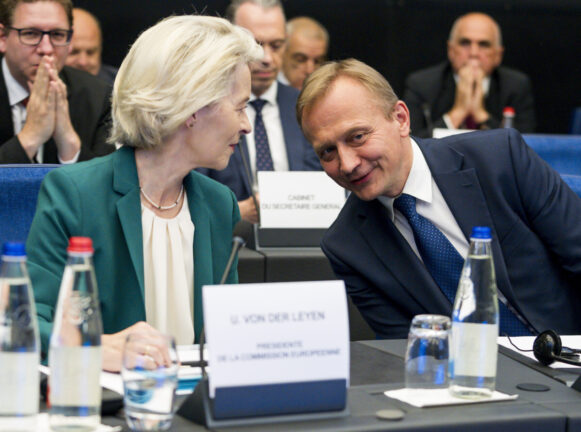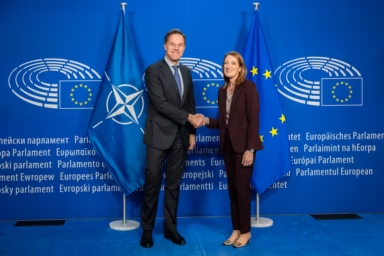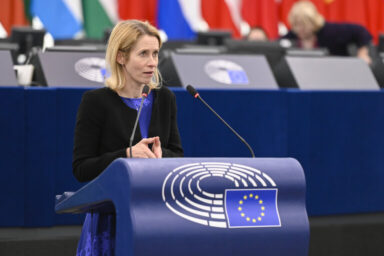The EU’s greatest problem in addressing today’s interconnected economic, technological, social, climate, and security concerns is a lack of capacity to spend and invest. The new Multiannual Financial Framework seeks to change this—but the hurdles it faces make delivering on its promises well nigh impossible, experts from the think-tank European Policy Centre claim.
Fabian Zuleeg, CEO of European Policy Centre describes the European Commission’s €1.2tn proposal for the 2028-2034 Multiannual Financial Framework (MFF) as “ambitious, considering the mega-challenges and transformational pressures that the EU is facing.” Yet he tempers optimism with realism: “Alas, this is unlikely to be the final outcome.”
The primary obstacle, he argues, is member states’ entrenched focus on juste retour. The principle says that national contributions to the EU budget should align with direct financial returns. Germany, the bloc’s largest net payer, has already signalled resistance to higher contributions.
Bypassing the constraints
Mr Zuleeg advocates bypassing traditional budget constraints through “common borrowing” and “coalitions of the willing” for defence or industrial projects. “If the end result is a static or potentially smaller MFF, but increased funding for issues such as security and defence by coalitions of the willing, the MFF negotiations should be seen as a success,” he says.
Eric Maurice (European Politics and Institutions Programme) underscores the tension between the Commission’s reform-driven conditionality and member states’ fiscal parochialism. The Commission seeks to extend the “reform-for-funds” model of the post-pandemic Recovery and Resilience Facility (RRF). It aims to tie payments to progress on European Semester goals like pension reforms or green transitions.
You might be interested
“The proposed MFF will generalise the RRF blueprint,” says Mr Maurice. He says that this “mainstreaming of conditionality” clashes with the juste retour mindset. To succeed, he argues, the MFF must address the RRF’s flaws. Those include “lack of transparency, of involvement of local and regional levels, and of cross-border projects in the plans.” Without accountability and clearer performance metrics, the policy risks deepening mistrust between Brussels and national capitals.
Green growth, or biodiversity blindspot?
At the heart of the MFF lies the proposed €451bn Competitiveness Fund (ECF), a consolidation of 14 existing programmes aimed at boosting clean tech, digital innovation, and industrial resilience. Philipp Lausberg (Europe’s Political Economy Programme) hails it as “the most important and revolutionary element” of the budget. “With a proposed size of €451bn, the Fund has the firepower to de-risk and mobilise significant private and public investment,” he says, emphasising its focus on sectors like AI, semiconductors, and quantum computing.
Mr Lausberg urges the creation of a complementary equity fund, financed by member states and sovereign wealth funds, to rival US and Chinese subsidies. “This will be crucial to address the EU’s problem with scaling up innovation,” he argues.
If the EU is serious about leveraging migration to address labour market gaps, it must ensure adequate funding for migrants’ integration. — Helena Hahn, Annalisa Buscaini, European Migration and Diversity Programme, EPC
Brooke Moore and Anna Crawford (Sustainable Prosperity for Europe Programme) offer a counterpoint. They warn that folding the LIFE programme—the EU’s sole fund dedicated to biodiversity—into the ECF sidelines nature conservation. “Biodiversity underpins the EU’s competitiveness and security. Over half of global GDP is tied to ecosystems,” they stress, criticising the Commission’s “bet on future solutions” like carbon capture over immediate ecological protections.
Insufficient ambition?
The Common Agricultural Policy (CAP), once a cornerstone of environmental policy, now suffers from “insufficient environmental ambition,” exacerbated by recent concessions to farmers. “The ECF must include binding earmarks for biodiversity, nature protection, and restoration,” they insist. Without such safeguards, the EU risks undermining the “foundations essential to long-term economic and societal resilience.”
Helena Hahn and Annalisa Buscaini (European Migration and Diversity Programme) outline a tripling of migration and border management funds under the MFF, with €14.3bn annually channelled into “National and Regional Partnerships Plans.” These Plans blend cohesion, agricultural, and external action funds to tailor support to member states’ needs.
Yet the authors foresee “trade-offs” between competing priorities. “If the EU is serious about leveraging migration to address labour market gaps, it must ensure adequate funding for migrants’ integration,” they argue. External pressures—such as reduced US aid to developing nations—could further strain resources. “This could amplify instability in the EU’s neighbourhood and beyond,” they warn, urging the bloc to balance humanitarian assistance with labour market demands. Flexibility, they note, is key—but hinges on member states’ “political willingness to ensure proper implementation and exit self-inflicted crises.”
Democracy’s double-edged sword
The Commission’s proposed €8.6bn AgoraEU programme merges the Creative Europe and Citizens, Equality, Rights and Values (CERV) funds, doubling support for media, culture, and civil society. Liza Saris (Transnationalisation Programme/Connecting Europe) calls it a “welcome investment in Europe’s civil society and culture,” but cautions that merging specialised streams risks a “diluted focus.”
Regardless of labelling, (CORE) looks like an additional corporation tax. — Fabian Zuleeg, CEO, European Policy Centre
Grassroots organisations, she notes, may struggle with the transition. “The discontinuation of CERV may lead to confusion and require time to access the new fund,” she says, stressing that success hinges on “clear regulations and effective communication.” The media strand’s role in countering disinformation—via initiatives like the European Democracy Shield—could bolster democratic resilience if managed deftly. However, increased competition for resources between civil society groups and media outlets threatens to fragment advocacy efforts.
CORE: A tax too far?
Mr Zuleeg, the think-tank’s CEO, dissects the Commission’s proposed Corporate Resource for Europe (CORE), a levy targeting firms with annual turnovers exceeding €10m. “Regardless of the labelling, this looks like an additional corporation tax,” he says, critiquing its design as “regressive” for taxing revenue rather than profit.
“It is levied on revenue not profit, so would it be applied even if a company is making a loss?” Mr Zuleeg asks, highlighting potential clashes with national tax systems.
Mr Zuleeg suggests CORE may be a “tactical move, a sacrificial lamb” designed to be rejected. That would ease the path for less contentious proposals. “Proposing CORE might simply be a tactical move, as member states will reject it,” he says. He also questions the ethics of such brinkmanship.
Ukraine’s lifeline
Svitlana Taran (Europe in the World Programme) details a €100bn Ukraine Reserve under the Global Europe instrument. It shifts focus from loans to non-repayable grants. “The new package places greater emphasis on non-repayable support to Ukraine,” she says. Annual ceilings for aid rise to €14.3bn.
The MFF’s support must reach the EU’s healthcare workforce to make it more resilient. — Samuel Goodger, Social Europe and Well-Being Programme, EPC
However, reconstruction and EU accession costs may still outstrip allocated resources. “The scale of Ukraine’s needs across key areas may exceed the established resources,” Ms Taran warns. She also advocates for “additional off-budget funding and a coordinated international response.” Military aid, she clarifies, remains separate under the European Peace Facility. As such, it is a reminder of the bloc’s fragmented approach to crisis management.
Samuel Goodger (Social Europe and Well-Being Programme) links robust health systems to economic resilience. “A healthy population is a resilient, prepared, and secure population,” he argues. Austerity measures prioritise short-term savings over long-term growth, which also draws his criticism. The Competitiveness Fund’s €23bn health allocation, he says, must address workforce shortages and promote preventive care.
Narrowing the ambition gap
“The MFF’s support must reach the EU’s healthcare workforce to make it more resilient,” he stresses. By prioritising immunisation and screening campaigns, the EU could reduce future treatment costs while bolstering societal readiness for crises.
The MFF negotiations will test the EU’s capacity to reconcile lofty ambitions with fiscal and political realities. Can the Competitiveness Fund rival global rivals without gutting biodiversity? Will AgoraEU empower democracy or dilute civil society? Can conditionality coexist with juste retour?
As populism surges, the budget talks transcend mere fiscal arithmetic—they are a referendum on European unity. The Commission’s success hinges on its ability to craft a budget that balances innovation with inclusivity. Other such axes are austerity versus ambition, and national interests versus collective security. Failure risks not just a smaller budget but a fragmented Europe, ill-equipped to face the “mega-challenges” of the 21st century.











